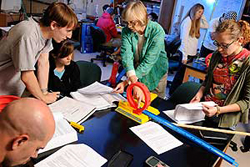Beth Thacker and Kelvin Cheng received $809,700 from the National Institutes
of Health to research teaching practices.
October 27, 2009
By John Davis

The Challenge Grant will allow Cheng and Thacker
(middle) find the most effective ways to teach introductory physics.
Two professors at the Department of Physics at Texas Tech University received
$809,700 in funding from the National Institutes
of Health (NIH) to analyze different teaching methods of introductory
physics and determine which methods work best for student understanding of the
material.
Beth Thacker, an associate professor of physics, and Kelvin Cheng, a
professor of physics, received the two-year Challenge Grant from the NIH's
National Institute of General Medical Sciences through the American Recovery and
Reinvestment Act (ARRA). Their award is one of 19 to researchers in 12
states.
Is a Hands-On Approach Really Better?
Cheng and Thacker will compare a course taught completely by hands-on,
lab-based instruction to the standard textbook-lecture-and-lab course and test
newly developed course materials designed to enhance student understanding. They
will compare student learning outcomes from teaching assistants who have
received teacher training to those who have not and compare courses taught with
lecture-lab synergy to those without integrated lecture-lab instruction.
Also, they will assess both the algebra-based and calculus-based introductory
physics courses.
"This funding is to make a large-scale assessment of these different types of
instructional methods," Cheng said. "It is interesting that this has not been
done before on a large scale. I'm hoping this will involve the whole department
in a collaborative effort."
Teaching the Teachers
Thacker said many instructors tend to teach the way they were taught and are
hesitant to adopt new curricula and teaching methods, even though physics
education research is beginning to indicate a number of non-traditional methods
may be more successful at increasing students' understanding.
"Very few large universities have researched teaching methods to see which
are more effective," Thacker said. "We are going to do a systematic study of
students understanding with a number different assessment tools that will allow
us to compare the effectiveness of different teaching methods."
The Challenge Grants seek to jump-start a range of research projects that
will address critical gaps in the basic biomedical and behavioral sciences,
including science, technology, engineering and mathematics education. Because
introductory physics is a requirement for pre-health profession undergraduates,
Cheng and Thacker hope to discover the most effective way to teach physics to
these students.
This article originally appeared on the Texas Tech Today website.
Reposted with permission.